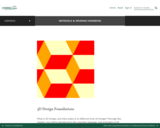
This course is designed to teach the basics of creating games for educational purposes.
- Subject:
- Education
- Material Type:
- Textbook
- Provider:
- Plymouth State University Pressbooks Sites
- Author:
- Cathie LeBlanc
- Date Added:
- 03/29/2020

This course is designed to teach the basics of creating games for educational purposes.

This is a collection of writing exercises, mostly (but not solely) aimed at high school and college classroom work. It is licensed with a Creative Commons Attribution-NonCommercial-ShareAlike 4.0 International License. You are free to copy and share its contents so long as you do so for noncommercial reasons and provide attribution.

What is 3D Design, and what makes it so different from 2D Design? Through this chapter, you will be introduced to the concepts, language, and principles of 3D Design, and explore translating a 2D drawing into a 3D object.

In this class, we questioned the very parameters of what counts as American literature. Is American literature defined by geographical boundaries? Experiences? Histories? Themes? What is the difference between American literature and American history? Who determines what counts as American literature? How does the in-depth study of early American literature prompt us rethink representations of American culture today? In our global era, it is clear that past definitions of American literature must be revisited. This anthology moves to answer the question “what is American literature?” by framing the texts in new and provocative ways that fit the modern age.

These chapters present a series of short readings with discussion questions and exercises related to basic research skills. Topics relate to the whole research process from identifying a topic through presenting one’s own work and address both library research as well as searching for and evaluating sources on the open web.
This work was originally created to serve the needs of IS1111 Tackling a Wicked Problem taught at Plymouth State University. You can see these chapters in the context of the other course readings at wicked-problem.press.plymouth.edu. This version has been revised to remove references to institution-specific resources and programs in the hopes that these chapters may be useful in other contexts.
While the title, Researching Wicked Problems, implies a narrow applicability, this content addresses basic information literacy skills useful in a variety of contexts at a level appropriate for first year college students.

Welcome to Critical Theory! We know that this field probably seems daunting, but now that you’re here, we’re here to help you get more comfortable with concepts such as ideology, constructivism, and the uncanny, to name a few. This handbook is a student-built guide that explains and exemplifies different literary theories. Written in accessible language with modern-day examples, this handbook seeks to make literary theory more manageable.
This handbook is a blend between a traditional textbook and an experimental anthology. It includes a range of pieces that show students grappling with the concepts themselves. Moreover, it’s free and organized according to the theories presented in the syllabus.